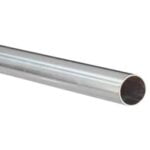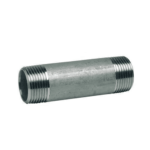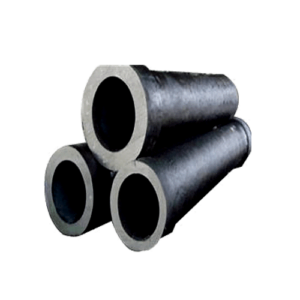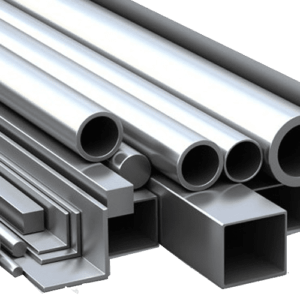Galvanized Iron Pipe
[GI Pipe] is a highly durable and versatile component used in various industrial and domestic applications such as water supply, gas distribution, and structural purposes. It is known for its excellent corrosion resistance and longevity making it essential for robust and long-lasting piping systems.
Material Specifications
Our [Gi Pipes] are made of high-quality galvanized iron which makes them very durable and rust/corrosion resistant. The pipes are subjected to hot-dip galvanizing process that ensures thick, uniform coating that enhances their performance as well as life span. In this regard, these pipes can be used both indoors and outdoors.
Technical Specifications
These [Gi Pipes] come in various sizes usually from ½-inch to 12 inches diameter. They have different wall thicknesses also length dimensions to suit different installation requirements. Comprehensive specifications include pipe diameter, wall thickness, length, pressure ratings etc. For example, medium duty applications often use the standard two-inch Gi pipe with a price specification tailored appropriately.
Standards and Compliance
Each [Gi Pipe] conforms to international standards such as ASTM, ASME or ISO 9001. We make sure to test our products so that they meet these standards which guarantees the safety, reliability and performance of our customers’ goods. On top of this certificate received from [Gi Pipe Manufacturers in Gujarat], show conformance with quality management system plus customer service excellence.
Usage Instructions
For optimal performance and durability of your [Gi Pipe], ensure you follow installation instructions given. Ensure that the pipe ends are clear of any dirt before connecting the fittings. Tighten connections hard enough to prevent leaking out fluids through joints.To get detail instructions refer to user manual or contact technical support team.
Applications
It finds critical applications in various piping systems by providing efficient flow and tight connections. Some examples include water distribution networks, gas pipelines or structural frameworks where it is extensively used. The [Cast Iron Pipe Fittings] variant is essential for providing smooth and leak-proof connections in complex piping layouts.
The [Gi Pipe] is particularly useful in both residential and commercial environments, offering strong resistance to corrosion and wear. It provides protection against adverse conditions due to its sturdy construction. For instance, the [2 Inch Gi Pipe] is popular because of its flexibility to provide secure connections that can be easily detached.
The [Gi Pipe] has been tailor-made to offer a tight connection and easy flow in highly stressed environments. Its robust mechanism ensures durability and reliability thus making it suitable for harsh and demanding conditions. These industries manufacture various types of Gi pipes as well as fittings including custom designed products that meet specific industrial requirements. In this way they are preferred suppliers for projects requiring high accuracy engineering and dependability.
Features and Benefits
Features:
High-quality galvanized iron material ensures superior strength and flexibility.
[GI Pipe] has a high load bearing capacity ideal for use in critical piping applications.
Its versatile design enables easier installation, quick securing reducing downtime or labor costs.
Benefits:
Long service life reduced maintenance due to durable materials used during construction process .
The [Gi Pipe] is an efficient tool at achieving seamless flow transition hence improving system reliability as well as safety.
Businesses enjoy competitive Gi pipe price from our company besides quality assurance resulting in affordable piping solutions offered at reasonable rates.
Related Products
[Pipe fittings]: These are essential connectors that can join different kinds of pipes.
[Valves]: These are used to regulate the flow of water or other fluid in a system. They can be used for distribution capabilities provided by Gi Pipes.
[Gaskets]: This is the most important tool that ensures leakage free joints between two flanges and also these seals enhance the life duration and maintain efficiency.
Call to Action
The piping system becomes more secure with our [Gi Pipes]. Use “Add to Cart” for instant buying, “Request a Quote” for bulk pricing while “Contact Us for More Information” provides tailored experiences. Just let our professionals from [Gi Pipe Manufacturers in India] help you get the best type of pipe according to your requirement.
Support and Warranty Information
For example, we offer [2 Inch Gi Pipe], [Cast Iron Pipe Fittings], and [Gi Pipe Fittings] which come with a complete warranty and full support from reliable companies like [Gi Pipe Manufacturers in Gujarat]. Our team will guide you through installation, operations as well as troubleshooting to ensure long term optimal performance.
Types of galvanized iron pipes
The process of galvanizations can be done in two ways majorlyHot dipped galvanized iron pipes
So the name indicates that there is the use of high temperature in this process. So the process starts with cleaning the carbon pipes mechanically or electrically to ensure that there is no dust present. After that carbon steel pipes are dipped into the zinc solution wherein the temperature is up to 500 degrees Celsius.As the process proceeds the zinc attaches with carbon steel to give it anti-corrosive properties. They are considered to be very effective anti-corrosive. They have been used for now more than 180 years.They are widely used in industries. The hot-dipped galvanized pipes have a thickness of 35μm and could go up to 650μm. They are used to transfer low-pressure liquids or gases. Some of the applications are mentioned below.Applications- Construction site
- Chemical industries
- Coal mining
- Petrochemical industries
- Automobile industries
- Power generation industries
Cold galvanized pipes
Cold galvanized pipes are also called electro-galvanized pipes. As the whole process is carried out electrically. The process is carried out by the electrolysis of iron pipes with zinc.The iron pipe is kept into a solution composed of zinc and a cathode connected to the electrolytic apparatus, placed opposite the tube member zinc plate, connected to the electrolysis the positive power equipment, the use of electric current from the positive to the negative directional movement will be in a layer of zinc deposited on pipe fittings, cold-plated fittings are galvanized after processing the first. The cold galvanized has a very thin layer of zinc of thickness5-15μm.Applications- Small industries
- Normal repair work
- Interior construction
- Home decor
| Basis of difference | Hot dipped galvanized | Cold galvanized |
| Operation temperature | 480-500 degrees Celsius | Room temperature |
| Thickness | 35μm -650μm | 5-15μm |
| Surface smoothness | It has a smooth surface | Has a rough surface |
| price | They are relatively expensive | They are cost-effective |
| Adhesion | They have a strong adhesion with the metal. This helps the zinc layer to stay for a longer time. | They have poor adhesion due to which there are chances of the layer to fall off. |
- GI pipes should not come in contact with lime or lime- mortar. They should be treated with anti-corrosive paints.
- Whenever a pipe passes through a wall, provision of expansion should be made.
- Under the floors, the pipes must be placed in the layer of sand to allow expansion.
- Chemical transportation
- Water treatment industries
- Fire safety types of equipment
- Sewerage
- Irrigation system
What are the Advantages of GI pipes?
- Prevents corrosion
- Low maintenance cost
- Proves them to be reliable
- Versatility
- Ease in inspection
- Faster accomplishment process
What are the disadvantages of galvanized pipes?
- Galvanized pipes may have some proportion of lead, this corrodes quickly and may reduce the lifespan of the pipe.
- They may leave rough patches inside the pipes, which may result in damage or failure in the pipes.
- They could be proved expensive in a situation where there is serious damage





















